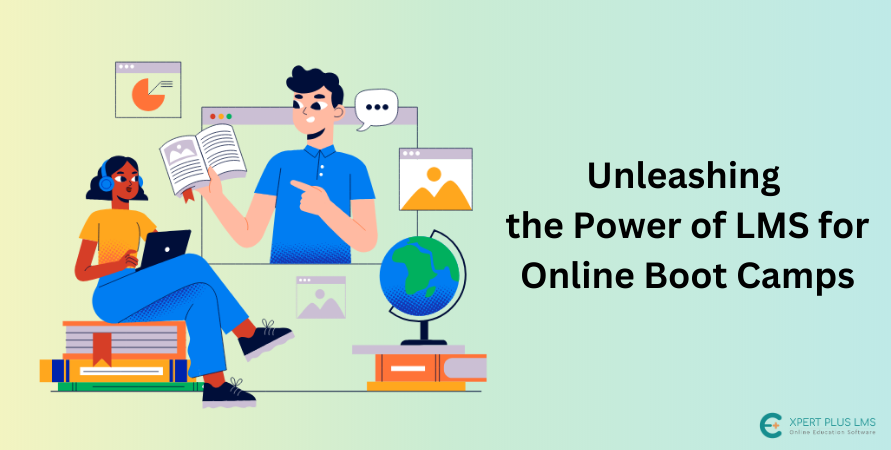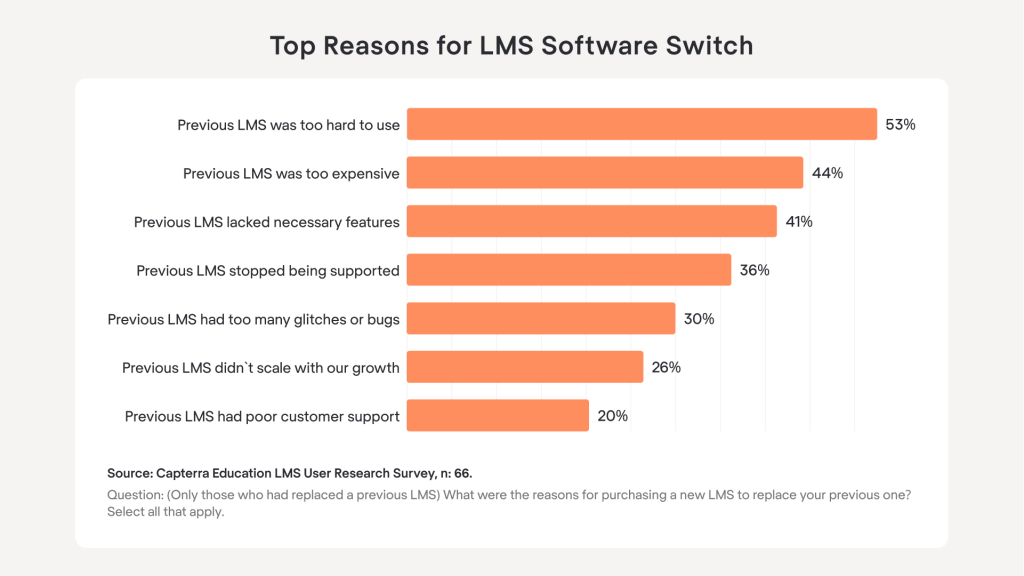Unleashing the Power of LMS for Online Boot Camps

An online boot camp is a flexible, intensive, and structured learning program conducted remotely through online platforms. It offers focused training in a specific field, such as coding, or any niche, within a limited timeframe. These programs provide practical skills, often through a combination of
✓ Self-paced learning
✓ Live virtual classes
✓ Course projects
Why Online Boot Camps Need a Learning Management System?
The Online boot camps are flexible, accessible from anywhere with an internet connection, and aim to prepare learners for career advancement or transitions. But during the pandemic and post-pandemic, the number of people seeking skill development and employees’ need for upskilling themselves has increased the number of online learners.

This is a statistic of the number of graduates that are recruited by major MNCs. So, the need for online boot camps is growing insignificantly. Traditional online classes do not provide insights and reports about a student’s progress or where they lack understanding. But LMS provides all the necessary information to make a boot camp successful and efficient. Here is how an LMS can help boot camps to become more efficient.
1. Centralized Platform: The LMS serves as the centralized platform for delivering and managing the educational content, interactions, and assessments within the boot camp. It provides a structured and organized environment for instructors and learners.
2. Content Delivery: The LMS enables instructors to efficiently deliver course materials in various formats, such as text, videos, presentations, and interactive elements. It ensures that learners have easy access to the content they need to progress through the boot camp curriculum at any flexible time.
3. Collaboration and Engagement: An effective LMS facilitates collaboration and engagement among participants. It provides tools such as discussion forums, chat features, and group projects, allowing learners to interact, share ideas, and support each other’s learning. This fosters a sense of community and enhances the overall learning experience.
4. Tracking Learner Progress: The LMS allows instructors to track learner progress, including completion of assignments, assessments, and milestones. This tracking capability enables instructors to identify areas where learners may need additional support and personalize the learning experience accordingly.
5. Assessment and Feedback: An LMS provides a platform for instructors to create and administer assessments, quizzes, and exams. It streamlines the grading process and enables timely feedback, helping learners gauge their understanding of the material and providing opportunities for improvement.
6. Data Analytics and Insights: A robust LMS collects data on learner performance, engagement, and interactions. By leveraging data analytics tools within the LMS, instructors, and administrators can gain valuable insights into learner behavior, identify trends, measure effectiveness, and make informed decisions to enhance the boot camp’s overall quality.
The Right LMS to Power up your Boot Camp’s Success
The choice of LMS for your boot camp is crucial because it serves as the central platform for delivering and managing educational content. It determines how easily instructors can create and distribute materials, interact with learners, and track their progress. A well-suited LMS enhances the learning experience and streamlines administrative tasks. So, here are some pointers to help you choose a better LMS based on your specific needs.
Tips For Choosing the Right LMS for Your Boot Camps
Choosing the right Learning Management System (LMS) for boot camps requires careful consideration of various factors. Here are some steps to guide you in selecting an LMS:
1. Identify your specific needs: Determine the specific requirements and goals of your boot camp based on your
✓ Niche
✓ Target Audience
✓ Demographics
✓ Age Group
✓ Number of participants
✓ Type of content you’ll deliver (text, video, interactive elements, screen sharing)
Also, consider factors such as the need for collaboration and engagement features, assessment and grading functionalities, and any specific integrations you may require based on the boot camp’s niche.
2. Research various LMS Platforms: Explore different LMS platforms that are available in the digital market, there are many potential LMS with different features and functionalities available, so make sure to select an LMS that caters to your boot camp needs. Look for features that align with your identified needs. Read reviews, compare features, and consider the reputation and track record of the LMS providers.
3. User Experience and User-Friendly Interface:

Learners like to learn but not in an environment (virtual) that isn’t user-friendly. So it is crucial to choose an LMS that is user-centric, mobile friendly, responsive (best viewed on all devices mobiles, tablets, PCS, and Laptops), and simple to use. The LMS should have an intuitive and user-friendly interface for both instructors and learners. A clean and easy-to-navigate interface reduces the learning curve and enhances the user experience making the learning experience a sophisticated one.
4. Scalability and Customization: A boot camp may start out with a few people and may reach massive numbers in time, so assess whether the LMS you are choosing can accommodate your boot camp’s growth and scalability. Additionally, evaluate the extent to which the LMS can be customized to match your branding, organizational requirements, and unique pedagogical approaches. Here is a statistics on the growth of boot camps in the year 2020.

5. Assess Compatibility and Integration: Check if the LMS integrates with other tools and systems you currently use or may need in the future, such as Augmented Reality, Virtual Reality, video conferencing platforms, content creation tools, or analytics software. Compatibility with different devices (desktop, mobile) and operating systems is also important for a seamless learning experience.
6. Check if the LMS is inclusive: Nearly 7.2 million students who are enrolled in online classes need assistive technologies based on their special needs. So, it is our responsibility to consider giving equal opportunities to all enrolled students. So, make sure the LMS you are choosing is inclusive and provides the necessary support and compatibility for assistive technologies.
7. Request demos: Request demos or take advantage of free trial periods to test the LMS firsthand. This will give you a better understanding of its functionalities, usability, and overall suitability for your boot camp.
Essential Features and Characteristics of LMS for Boot Camps
- User-Friendly Interface: The LMS should have an intuitive and user-friendly interface for both instructors and learners. It should be easy to navigate, allowing users to quickly access and manage course materials, assignments, and assessments.
- Content Management: The LMS should provide robust content management capabilities, allowing instructors to easily create, organize, and deliver course materials. This includes support for various content formats such as text, video, audio, and interactive elements.
- Assignment and Project Management: A comprehensive assignment management system is vital for boot camps. The LMS should enable instructors to create and distribute assignments, set deadlines, receive submissions, provide feedback, and grade student work efficiently.
- Course Reminders or Push Notifications: The LMS should provide the necessary Course reminders during important online sessions. Also, the instructor should be able to send notifications via email or text. Also, there should be automated
- Tracking and Progress Monitoring: The LMS should offer tracking and monitoring features to allow instructors to monitor learner progress. This includes tracking attendance, participation, completion rates, and performance on assessments. Learners should also have access to their own progress data.
- Discussion Forums: The key to any learning platform is discussion forums. Peer-to-peer interactions take place here; they clear up ambiguities, discuss subjects, and build a supportive environment where people can learn from one another. Their rate of course engagement rises as a result.
- Assessment and Grading: The LMS should support various assessment types, including quizzes, exams, projects, and assignments. It should allow for automatic grading when applicable and provide instructors with flexible grading options and rubrics for subjective assessments.
- Course Certification: The majority of students choose to obtain a certificate as proof of successful completion following the course. All of the major players in the online tutoring market, including Lynda, Oxford Home Study, and LinkedIn Training, offer completion certificates. So, make sure the LMS provides the necessary options for delivering course completion certificates.
- Analytics and Reporting: The LMS should offer robust analytics and reporting capabilities. This includes generating reports on learner progress, engagement, assessment results, and other relevant data. Advanced analytics can help instructors identify areas for improvement and personalize learning experiences.
- Mobile App: A survey has reported that the downloading of mobile apps rose from 84 billion downloads from the App Stores (both Android and iOs) in 2016 to 105 billion in 2018 (Sensor Tower). As more learners access content through mobile devices, it is essential for the LMS to be mobile-friendly and responsive. It should provide a seamless user experience across different devices and screen sizes.
- Integration Capabilities: The LMS should have the ability to integrate with other tools and systems commonly used in boot camps, such as video conferencing platforms, content creation tools, or student information systems. Integration simplifies workflows and ensures a cohesive learning environment.
- Robust Software: Data security and privacy are critical considerations. The LMS should employ robust security measures to protect learner information, including secure authentication, data encryption, and adherence to privacy regulations.
Technological Challenges and Factors that Influence Boot Camps and How LMS Helps it Overcome?
Boot camp organizations face several technological challenges and factors that can influence their operations. Here are some common ones to consider and how LMS overcomes each challenge:
1. Infrastructure and Connectivity: Boot camps heavily rely on a stable and high-speed internet connection for delivering online content, conducting live sessions, and facilitating interactions between instructors and learners. Limited access to reliable internet infrastructure or poor connectivity can hinder the effectiveness of the boot camp. But LMS has a video library facility, where the lectures and live sessions can be stored, which can be accessed in the future.
2. Platform Selection and Compatibility: Choosing the right online learning platform is critical. It should align with the boot camp’s goals, support the desired teaching methods, and accommodate the number of participants. Compatibility with different devices and operating systems is important to ensure a seamless learning experience for all learners. All the LMS platforms almost have intuitive and responsive designs.
3. Scalability and Performance: As boot camps grow in popularity and the number of participants increases, ensuring the scalability and performance of the technological infrastructure becomes essential. The LMS systems have the ability to handle high user loads without experiencing significant slowdowns or disruptions.
4. Data Security and Privacy: Basic boot camp organizations handle sensitive learner information, including personal details and learning progress data which may be vulnerable to cyber-attacks. Implementing an LMS with robust data security measures and adhering to privacy regulations protects learner privacy and maintains trust.
5. AI Friendly: AI learning is taking over every sector, with inventions like Chat GPT and other AI technology, the LMS has options to deploy AI-assisted learning experiences which are not available with traditional and online classes.
In summary, the choice of LMS significantly impacts the success of hosting a boot camp. A well-suited LMS enhances the learning experience, facilitates effective content delivery, promotes collaboration, provides comprehensive tracking and assessment capabilities, and empowers instructors and administrators with valuable insights to improve the boot camp’s overall effectiveness.




